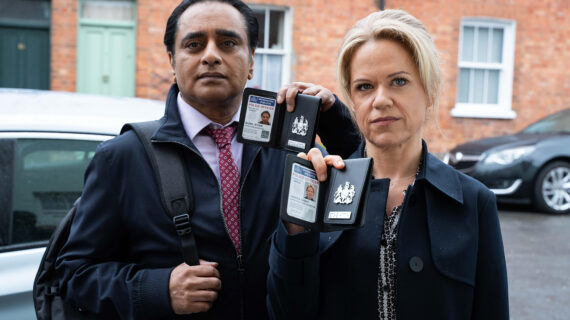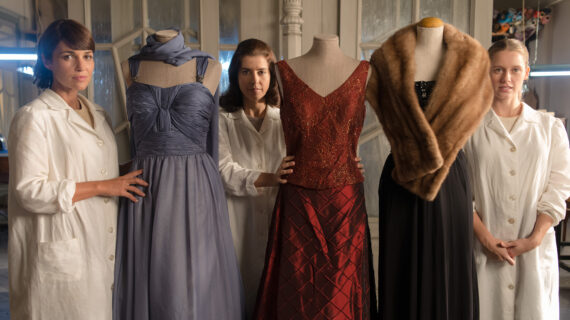Announcer:
The following program is a PBS Wisconsin original production.
Frederica Freyberg:
The Wisconsin Elections Commission deadlocks on drop box guidance. Omicron’s new variants are evading immunity. The U.S. Senate race heats up and the holding pattern of reproductive health.
I’m Frederica Freyberg. Tonight on “Here & Now,” the new chair of the Wisconsin Elections Commission speaks to upcoming election guidance. Epidemiologist Michael Osterholm on the BA.5 variant. U.S. Senate candidates appeal to voters ahead of the August primary and with abortion now illegal in Wisconsin, what does that mean for emergency contraceptives. It’s “Here & Now” for July 15.
Announcer:
Funding for “Here & Now” is provided by the Focus Fund for Journalism and Friends of PBS Wisconsin.
Frederica Freyberg:
The Wisconsin primary election is less than a month away and the agency tasked with making elections go in this state is busily trying to interpret court rulings and other guidance. But meanwhile, the Wisconsin Elections Commission remains in the eye of the election fraud storm, as all three Republican candidates for governor support getting rid of the commission following its election guidance during the peak of the pandemic. Enter new Wisconsin Elections Commission Chair Republican Don Millis. He joins us now and thanks very much for being here.
Don Millis:
My pleasure to be here.
Frederica Freyberg:
So what is it like to enter as the new chair of the commission when people in your own party want to do away with it?
Don Millis:
There’s a lot of catching up to do. We’re trying to make the best of what we have. Whether or not the commission goes away is certainly a controversial issue. There are folks, Republicans, who want to get rid of the commission. There are other ones who want to keep it. Whether the commission stays or goes is beyond my pay grade. My role is to make sure we run an efficient and honest election in August and in the general. That’s — that’s really all I can do. I can’t look beyond that.
Frederica Freyberg:
So what do you think, though? What is your position on the idea of abolishing the elections commission?
Don Millis:
Well, I don’t have — I really don’t have a — I haven’t given it much thought. I do think, and I was on the record in 2016 when I was first appointed when the commission was created, that the Elections Commission was a serious upgrade over the Government Accountability Board. I also served on the prior agency. So my biggest concern about the commission is that we seem to be deadlocked on all the important — important issues of the day. And my warning to other commissioners is if there’s a chance to keep the commission, we better start working together.
Frederica Freyberg:
In fact, just this week, this issue that you speak to of the deadlock because there are three Democrats and three Republicans on the commission, you end up with a deadlock. Now, Republicans like yourself wanted to offer guidance to clerks after the Supreme Court ruled absentee ballot drop boxes are illegal. Dems said that guidance would confuse clerks more than help. What about these deadlocks on the commission? Does that set up render it ineffective in your mind?
Don Millis:
It does. I mean I thought it was outrageous that the commission couldn’t agree to issue a staff — these are career civil service staff who tried to distill a 141-page decision with two concurrences. A decision that’s very complicated, distilled it to a page and a half that we could give out to the 1800-plus clerks, most of them, the vast majority of whom don’t have lawyers to go to consult with. And the very fact we couldn’t do something so basic doesn’t — doesn’t bode well for the future of the commission.
Frederica Freyberg:
Why did you in particular want to offer that guidance to clerks?
Don Millis:
Clerks, the vast majority of clerks work very hard. They have a lot of roles. They have to deal with other agencies of state government. Elections is a very important, perhaps the most important part of their job. But it’s not the only part of their job. And the Election Commission exists, one of the — for a primary reason to provide guidance to clerks. This was a very well-written page and 1/2 memo that would have distilled what they can and cannot do with drop boxes. There’s a lot of information out there, not all of it good. This information was accurate and should have been provided to the clerks.
Frederica Freyberg:
What, in a nutshell, was the guidance?
Don Millis:
The guidance says — commission interpreted the decision that you cannot have unstaffed drop boxes that — statutes require that absentee ballots be returned in person by the elector. That was the guidance. And that’s — basically what the Supreme Court ruled. And we tried to make it clear and so that we could address those questions.
Frederica Freyberg:
What about the issue raised by disability rights advocates that federal law, they say, protects the right of disabled people to get help mailing their ballot or deliver it to the clerk?
Don Millis:
We agree. In fact, the Republicans offered to add to the guidance a provision that would remind clerks of the requirements of the federal law, that requires — that overrides state law, that clerks must make accommodations for people who are illiterate, who are blind, or disabled. That’s the language of the federal law. And that guidance was even shot down. Three Democrats wouldn’t even agree to put that into the guidance.
Frederica Freyberg:
Among the Republicans on the commission right now is Bob Spindell who was one of the false electors for Trump now getting attention, as you know, from the January 6th Committee and possibly the U.S. Justice Department. What is your comment on Wisconsins slate of false electors?
Don Millis:
Well, Im reluctant to talk about that. There is a lawsuit that’s pending. The commission — there was a complaint filed with the commission. The commission dismissed the complaint on a 6-0 vote. The complainants are suing the commission including Commissioner Spindell in court. The commission staff have recused themselves. And one of the unpleasant duties that I have as commission chair is I am quarterbacking that case and the outside attorneys are reporting to me. So Im not going to comment on it. I do agree, I will agree, though, that I thought the commission’s decision was correct, that the ultimate slate of electors, as far as I can tell, did not violate any Wisconsin law that was presented in that complaint.
Frederica Freyberg:
What about calls to decertify the 2020 election?
Don Millis:
The — even the counsel representing the prevailing party in the drop box cases, counsel there have conceded that there’s nothing that can be done right now to decertify the 2020 election. As far as I can tell, the commission has no role at this point in dealing with the 2020 election. My job has been to look forward. We have — seems to me despite many advances in election technology, our confidence in election results is at an all-time low. In 2016, I was sued because, among others, because of the many people on the left felt that Hillary Clinton won Wisconsin and in 2020 you have the same thing where people on the right believed that Donald Trump won. Right now the commission has no role in that. My job is to look forward and try to enhance the public’s confidence in elections.
Frederica Freyberg:
I trust that you do believe that Joe Biden legitimately won the presidency?
Don Millis:
I have my personal feelings on that. It seems that every time Im asked about my role on the commission, that’s one of the questions that is asked of me. Clearly, the Supreme Court decided that there were things that were untoward in terms of the drop boxes. Whether that had an impact on the election results — I don’t know that there’s any evidence of that but Im not going to opine on whether or not, in my role as head of the commission that one candidate won over another. I’m trying to look forward.
Frederica Freyberg:
Don Millis, thank you very much.
Don Millis:
Thank you.
Frederica Freyberg:
In COVID-19 news, Milwaukee is reinstating mask guidance and Dane County is extending the emergency hotel shelter program for those experiencing homelessness. These measures as Wisconsin topped 2,000 positive cases over one day this week. A number not seen since early June, according to the Wisconsin Department of Health Services. The state’s official positivity rate sits at over 13%. But that’s certainly an undercount with at-home test results not appearing in these numbers. Where are we headed with this enduring pandemic at this point? We asked national expert Michael Osterholm, director of the Center for Infectious Disease Research and Policy at the University of Minnesota. He joins us from Minneapolis. And thanks for being here.
Michael Osterholm:
Thank you.
Frederica Freyberg:
So what are the estimates for how big of an undercount it is in positive cases currently posted on public dashboards?
Michael Osterholm:
We just really don’t know. I will have to say, using that old rural Wisconsin approach to understanding life where you wet your figurer and put it up in the air and that’s how you determine which way the wind is coming, that’s pretty much what we’re doing right now in terms of looking at COVID cases. We have major undercount occurring because people are not getting tested, using the kinds of testing systems like the PCR testing system that would give you results that get reported. As you noted, many people who are using at-home testing, those results, first of all, are somewhat challenging. We know a lot of people right now are testing negative when in fact they have positive. In addition, they’re not getting reported. So I would say at this time, it’s clear there are many, many more cases occurring in the community. I personally know of more people in my own life right now that are infected than Ive seen at any time in the entire pandemic. So the one thing that we are using right now as a measure indirectly of what’s happening is hospitalizations and deaths. And unfortunately both of those are creeping up quickly throughout the country.
Frederica Freyberg:
Our state lab says that the BA.5 variant is now the dominant one. What do we know about this variant?
Michael Osterholm:
Well, as we’ve been talking about on this very show for the better part of the last two years is that this virus continues to throw 210-mile-an-hour curveballs at us. BA.5, which is a subvariant of Omicron, is now one that can evade the immune protection not only of the vaccines but in addition, even those who had BA.1, the earlier subvariant of Omicron in December and January are now getting infected with BA.5. So this is one of the issues we have with the COVID situation is in fact that the immune evasion of these newer variants is really a problem for us in terms of just understanding just how many new infections will occur, what will happen. We just don’t know at this point.
Frederica Freyberg:
So quoting from an Atlantic article I just read, “more variants mean more infections, more infections mean more variants.” How does this cycle look moving forward, say, into the fall?
Michael Osterholm:
Well, it’s clear that, you know, you can’t get to the point eventually of where, you know — all you have to do is look at somebody across a football field and you get infected. That’s not going to going to happen. But each time a variant emerges and takes over, it’s because they have a better fitness, meaning they’re more infectious. They’re more able to evade immune protection. As so we’re going to likely continue to see not only with Omicron — what will be after BA.5? Will we have a BA.7? We’re now looking at a BA.2.75 which may actually have some additional properties beyond BA.5 to make it the dominant variant. But we also have to be concerned about what we call Pi or Sigma. As you know, we name these variants after Greek letters. What’s next? We don’t know. And so I think we have to expect at this point the unexpected. When we talked on this show a year ago, who could have imagined Omicron? Who could have imagined how it would be so highly infectious and spread through our communities? Well now fast forward. What will it be like next winter? What will it be like next fall. We don’t know. All I can tell you is while the U.S. is done with the pandemic. Look across the board. The citizens are done with it but the virus isn’t done with us yet. That’s what we’re trying to reconcile.
Frederica Freyberg:
It seems that folks have pretty much quit wearing masks. Should we be?
Michael Osterholm:
Well I’ll tell you right now, I still wear mine if Im in a public setting where I may be exposed to someone else’s air. And we are seeing many, many cases right now occurring from being in public settings where people are not wearing any kind of respiratory protection. Even those who think if I just take it off for 45 minutes to eat in a restaurant, Im okay. That’s not true. We have many cases occurring there. What the challenge is right now, is if these are milder illnesses, as a number of them are, people say well, that’s the price of life I pay to live in a world of COVID. I want to live my life. We all understand that. I want to do that. But if you’re someone who’s at risk for serious illness, hospitalizations, or death, you’re older, you have underlying immune compromised conditions, you are overweight. All the factors that might predispose you to severe illness, right now, your best bet is to one, be as vaccinated as you can be. If you can get four doses by age, get it or three doses. But in addition, to protect yourself in the public setting, you want to go out in the public, have that N95 respirator on and that can go a long ways in protecting you and allowing you to still go to movies, concerts, things like that. If you have that protection on, that’s what you need to do.
Frederica Freyberg:
Should we hold out hope for a variant-specific booster reportedly coming this fall?
Michael Osterholm:
You know, I am not a big fan of the subvariant boosters. In the fact of just think of the following. We just got done talking about how BA.5 basically is now infecting people who had BA.1. So right there is an example of a subvariant that is not successfully protecting you if that were a vaccine. Now, if you look at what’s going to happen going forward in the next four to five weeks to several months, something is going to replace BA.5. So even if you have a subvariant vaccine, there’s no necessary indication that will protect you more. So I think if we chase this virus by just trying to catch up with the subvariant development and then make new vaccines, we’ll always be a day late and a dollar short. Still the most important thing you can do is get the regular vaccine we have right now, knowing that it won’t necessarily protect you from getting infected but it can go a long ways in protecting you against serious illness, hospitalizations, or deaths.
Frederica Freyberg:
Dr. Michael Osterholm, thanks very much for your information.
Michael Osterholm:
Thank you.
Frederica Freyberg:
Turning to “Here & Now 2022,” election coverage, tonight we give you a look at the candidates running for U.S. Senate in Wisconsin. Over the weeks leading up to the August 9 primary, we’re sharing excerpts of interviews reporter Steven Potter conducted with eight Democrats and one Republican challenger to incumbent Senator Ron Johnson. We start with candidate Mandela Barnes. He’s currently lieutenant governor of Wisconsin, elected to that position in 2018. Before that he served two terms in the Assembly representing his Milwaukee district.
Steven Potter:
Currently Wisconsins lieutenant governor, previously you were a state lawmaker. Why do you want to be a U.S. senator?
Mandela Barnes:
Im running for the U.S. Senate to rebuild the middle-class, the same middle class that give me so much opportunity. A mother who was a public school teacher. And my dad worked third shift on an assembly line. Those jobs were their tickets to the middle class and unfortunately, those tickets are harder and harder for people to come by. Whether you’re in urban communities or rural communities. We’re in desperate need of leadership right now. People who have a firsthand understanding of what is actually going on. People like Ron Johnson have left people in every corner of this state behind. That is a problem, especially as people see rising costs at the grocery store, at the gas pump. We see our industries in crisis, manufacturing is suffering. Our small family farmers are being squeezed out by large corporate monopolies. Yet at the same time, we have an out-of-touch U.S. Senate that is broken. And that’s one thing I also hear from people too, that it is a millionaire’s club that they want to see broken up, because the overwhelming majority of people in this state and across this country are not millionaires and that’s why the issues continue to get swept under the rug. So I decided to run for the U.S. Senate to make sure that the opportunity that I had growing up is available to every person in every county and every zip code all across the state.
Steven Potter:
If elected, what would your legislative priorities be?
Mandela Barnes:
We have a unique opportunity to address climate change and create good-paying jobs in the process but we have to be aggressive to take advantage of it. We also have to save our democracy. Nothing else matters if we don’t protect the right to vote. If we don’t make sure that people have access to the ballot as they should. And what’s top of mind for so many other people is protecting the right to choose.
Steven Potter:
Ron Johnson has won election to the senate twice. Why are you the candidate, the Democrat, who can beat him in the general election in November?
Mandela Barnes:
There’s an imminent threat with Senator Johnson in the U.S. Senate. A threat to our democracy, a threat to our way of life. We need leaders who are going to step in and say enough is enough. People who are going to step in, put an end to these practices that have made it harder and harder for everyday people to get ahead. We have to change Washington and the only way we change Washington is when we change the people we send to Washington.
Frederica Freyberg:
Next up is another candidate from Milwaukee. Alex Lasry is senior vice president of the Milwaukee Bucks. Prior to joining the Bucks, Lasry worked in various roles for the Obama administration.
Steven Potter:
Currently an executive for the Milwaukee Bucks, why do you want to be a U.S. senator?
Alex Lasry:
Im running because I want make sure that we’re able to get things done. I think one of the biggest frustrations Ive had with Washington, I think all of us have had with Washington over the last number of years, is the fact that we’ve got a lot of people in office who just aren’t getting things done. And I think that’s where a lot of voters’ frustration are and that’s something Ive been able to do my entire career, whether it’s raising wages, creating thousands of good-paying union jobs, bringing investment to this state.
Steven Potter:
If elected, what would your legislative priorities be?
Alex Lasry:
I think the top legislative priority is more of a process issue. We have to make sure that we get rid of the filibuster because that’s how we’re going to make sure that we can actually get things done, like codifying Roe v. Wade, like making sure that we ban assault weapons, like making sure that we pass things like the PRO Act so we can raise wages and give workers their rights back. I think one of the things we’ve seen many economists say is one of the best things we can to do to make sure that we’re mitigating inflation is getting rid of the Trump tax cuts. I want to make sure that we’re able to do that so we aren’t creating these tax breaks that make it easier to ship jobs overseas but actually working for investments on education, job training, bringing those jobs back here to Wisconsin so that we can actually invest in our workforce and bring higher wages and more jobs to the state.
Steven Potter:
Ron Johnson has won this election twice. Why are you the candidate who can beat him in the general election in November?
Alex Lasry:
When you look at the last 12 years, Ron Johnson has done nothing for the state of Wisconsin. The only thing he’s done is pass a tax cut to enrich himself and his friends and make it easier to ship jobs overseas. Do you want who’s done nothing for the last 12 years and is actively hurting the state? Or someone who has brought jobs, raised wages, and created investment here so that we know that when they get to Washington, they’re going to be able to do that same thing? I think when we make that choice clear, the choice is going to be really simple.
Frederica Freyberg:
Find the interviews with candidates running for U.S. Senate on our news page on PBSwisconsin.org.
We also have an invitation out to incumbent Senator Ron Johnson for an interview on this program.
Turning to another national issue unfolding in Wisconsin, illegal abortion has led to an increased demand for emergency contraceptives. Some pharmacies are stocking up on these largely over-the-counter drugs. Marisa Wojcik spoke with the pharmacist and owner of the Fitchburg Family Pharmacy, Thad Schumacher.
Marisa Wojcik:
Are you concerned that emergency contraceptives could be banned or severely limited in access?
Thad Schumacher:
I do have that concern. I feel like the potential for that to occur is possible. As of a few weeks ago, I didn’t think that legal abortion would be gone and it is now. I know there are people who believe that — that there shouldn’t be any medications that would affect a fetus or any medications that would affect an embryo. So I think they’re at risk.
Marisa Wojcik:
Has the demand for emergency contraceptives gone up?
Thad Schumacher:
We have seen it go up. We probably sold one — one package probably a month prior to the decision. We have sold several packages a day since the decision. I think we saw that there’s a trend that the — that people are going to be wanting to get emergency contraceptive care for themselves to have it around. And that created an increase in demand, which can result in a short supply. And of course, a short supply can lead to increased price. And so I think we made a decision to try and purchase a large quantity so that we could have it on hand and then decided to make it — basically sell it at our cost so we could make sure to dampen any risk of increased price.
Marisa Wojcik:
So emergency contraceptives, those are different from abortion medication, right?
Thad Schumacher:
Correct. Correct. These are medications. These emergency contraceptives are medications that you take in the first three days of a sexual event that was not protected. And so you can use those within three days after that to be about 90 to 95% effective.
Marisa Wojcik:
We’ve heard a little bit about potentially people who have the potential to get pregnant are no longer being prescribed things that could lead to a miscarriage or harming the fetus. Has that been an issue at all?
Thad Schumacher:
We haven’t seen that here. We have heard talking — we have heard other professionals talking about medications that are used for the treatment of arthritis, treatment of — of other medical conditions that are not related to abortion. And those drugs are not being available because they can be used in abortion. We haven’t seen that here. If we got a prescription for one of those medications at this point, I think it would be — our policy would be to call the provider who wrote the prescription and ask for a diagnosis and why it’s being used. So that we can ensure that we were using it — outside of the reasons for — that they’re used for abortion.
Marisa Wojcik:
Has this changed the way you have conversations with providers?
Thad Schumacher:
Yeah, I think that as we move forward with medications that have multiple uses, and there are legal ramifications about using the same medication, if you use it this way, it’s illegal and if you use it this other way it’s not illegal, I think we’re going to see more conversations between providers and pharmacists to discuss exactly why these medications are being used so they can be documented.
Marisa Wojcik:
Are there liabilities for you as a pharmacist for providing these medications?
Thad Schumacher:
I believe the law in Wisconsin would come into play if I were to prescribe — dispense medication that could be used to abort a fetus. So, yeah.
Marisa Wojcik:
What do you think is going to happen going forward? Do you have any concerns?
Thad Schumacher:
I think we’re probably in a holding pattern at this point and I don’t expect much to change. I think if we’re going to have reversal of the current law, it’s going to have to come from the federal level.
Marisa Wojcik:
What have you been hearing from customers since Roe was overturned and just in general about the need for this kind of care?
Thad Schumacher:
So we’ve heard a lot of thank yous. We have gotten a lot of support from the community.
Marisa Wojcik:
And do you see this as patient care for your customers?
Thad Schumacher:
Yes. Access to — access to care is one of the most important things that we think that we can provide. And so, yes, it’s important this is accessible to everyone who needs it.
Frederica Freyberg:
For more on this and other issues facing Wisconsin, visit our website at PBSwisconsin.org and then click on the “news” tab. That’s our program for tonight. I’m Frederica Freyberg. Have a good weekend.
Announcer:
Funding for “Here & Now” is provided by the Focus Fund for Journalism and Friends of PBS Wisconsin.
Search Episodes
Related Stories from PBS Wisconsin's Blog

Donate to sign up. Activate and sign in to Passport. It's that easy to help PBS Wisconsin serve your community through media that educates, inspires, and entertains.
Make your membership gift today
Only for new users: Activate Passport using your code or email address
Already a member?
Look up my account
Need some help? Go to FAQ or visit PBS Passport Help
Need help accessing PBS Wisconsin anywhere?

Online Access | Platform & Device Access | Cable or Satellite Access | Over-The-Air Access
Visit Access Guide
Need help accessing PBS Wisconsin anywhere?

Visit Our
Live TV Access Guide
Online AccessPlatform & Device Access
Cable or Satellite Access
Over-The-Air Access
Visit Access Guide
 Passport
Passport

















Follow Us